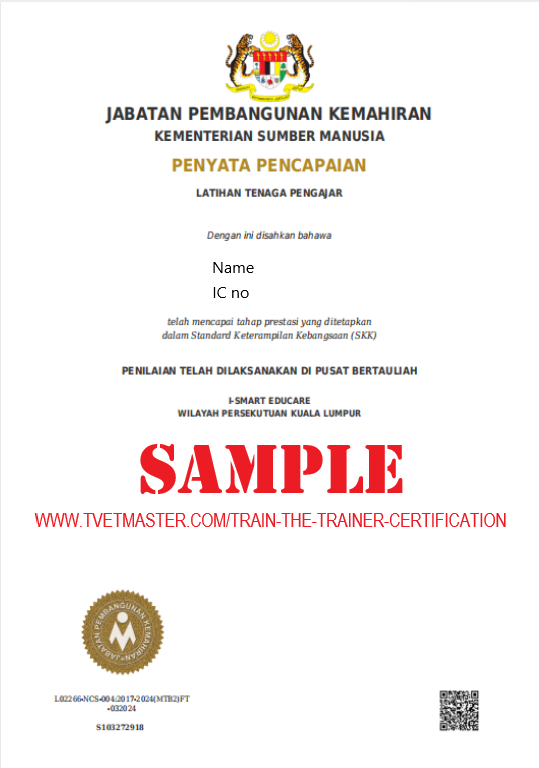TVET Micro-Credentials
There are two parts to this, TVET and Micro-Credentials.
TVET is known as Technical and Vocational Education and Training.
As for the definition of Micro-Credentials, UNESCO organised a global expert panel to reach a consensus on a definition, which resulted in a report titled Towards a Common Definition of Micro-credentials in 2022.
The report proposed a definition of a micro-credential as “a record of focused learning achievement verifying what the learner knows, understands or can do”. It also “includes an assessment based on clearly defined standards”, “is awarded by a trusted provider”, “may also contribute to or complement other micro-credentials or macro-credentials through recognition of prior learning” and “meets the standards required by relevant quality assurance”
Micro-credentials are short courses but not all short courses are micro-credentials. Accordingly, pre-determined standards are employed to assess micro-credential learners’ achievements and the awarding body also has to meet several standards to qualify as a trusted provider. Unlike many short courses, micro-credentials are stackable, which means that they can lead to a degree or certification. While many short courses lack external quality assurance, micro-credentials go through a quality assurance process.
The global trend towards micro-credentials presents exciting opportunities for Malaysia’s Department of Skills Development (DSD) and the TVET industry as a whole. Let’s explore how this new approach to learning aligns with the needs of Malaysian employers and workforce development, with a particular focus on the crucial role of NCS-TTT certified trainers.
Boosting Employability with Stackable Skills
Similar to the global scenario, Malaysian employers struggle to find workers with the exact skillsets needed. DSD’s TVET micro-credential programs can address this gap by offering targeted training modules focused on in-demand skills. These modules can be stacked together to create a customized skillset relevant to specific job requirements.
Imagine an aspiring drone pilot acquiring a TVET micro-credential in “Rotary Drone Flying Operation” followed by another in “Ecommerce Marketing.” These stackable credentials demonstrate expertise valued by employers, enhancing the individual’s competitiveness in the job market.

NCS-TTT: Equipping Trainers for Micro-credential Delivery
The success of DSD’s micro-credential program hinges on the quality of trainers delivering these programs. The National Competency Standard Train-the-Trainer (NCS-TTT) program, offered by the Department of Skills Development (DSD) via accredited training centres such as I Smart Educare, ensures trainers possess the necessary skills to effectively develop, deliver, and assess micro-credential programs.
What is NCS-TTT?
The NCS-TTT program equips trainers with the competencies to:
- Understand how adults learn
- Perform training needs analysis
- Design and conduct effective training sessions
- Assess participants’ course learning outcomes
Trainers who successfully complete the NCS-TTT program receive a certification, signifying their expertise in delivering competency-based training programs like micro-credentials.

Benefits of NCS-TTT for Micro-credential Trainers
- Enhanced Training Delivery: NCS-TTT equips trainers with the pedagogical skills to deliver engaging and effective micro-credential programs, maximizing learning outcomes for participants.
- Industry Alignment: The program emphasizes designing training aligned with current industry needs, ensuring micro-credentials equip learners with the most relevant skills.
- Quality Assurance: NCS-TTT certified trainers uphold high standards in developing and delivering micro-credentials, fostering trust and credibility in the program.
TVET & Universities: Collaboration, Not Competition
Just like universities worldwide, Malaysian universities are no longer capable of providing skills-based credentials. The DSD’s TVET micro-credential programs can complement university education by offering focused, industry-aligned training. This fosters collaboration, not competition, between TVET institutions and universities.
Universities could potentially offer micro-credentials alongside traditional degrees or recognize DSD-issued credentials for credit within their programs. This creates a more dynamic and flexible learning ecosystem catering to diverse student needs.
Recognition and Quality Assurance: Building Trust
The success of TVET micro-credentials hinges on quality assurance and industry recognition. DSD’s program should establish clear criteria for awarding these credentials and collaborate with industry leaders to ensure their relevance to current job requirements.
Following frameworks like the UNESCO definition and quality assurance processes will build trust in DSD’s TVET micro-credentials among employers and learners alike.
The Future of Skills Development
TVET micro-credentials offer a shorter, more cost-effective way to acquire in-demand skills compared to traditional TVET programs. This caters to the needs of working professionals seeking to upskill or those seeking faster entry into the workforce.
The DSD’s TVET micro-credential program, if implemented strategically, can position Malaysia’s TVET system at the forefront of skills development. It can equip the workforce with the agility and adaptability needed to thrive in the ever-changing job market.


